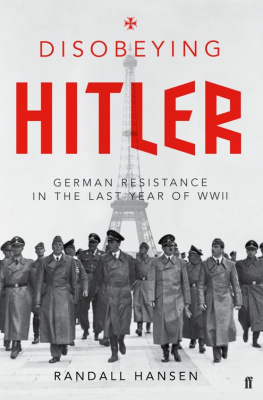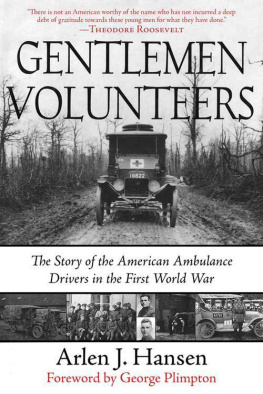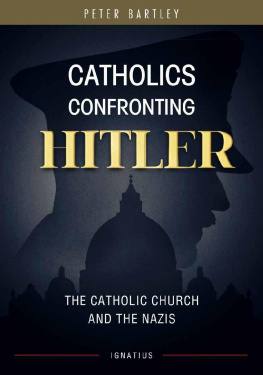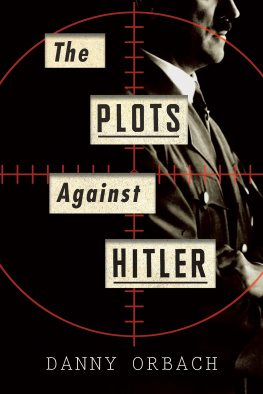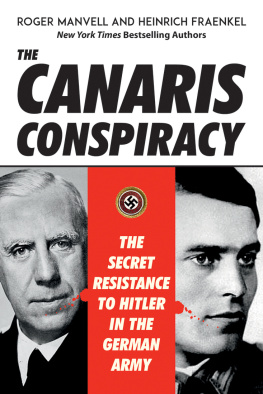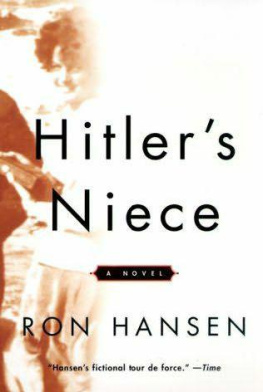Hansen - Disobeying Hitler: German resistance in the last year of WWII
Here you can read online Hansen - Disobeying Hitler: German resistance in the last year of WWII full text of the book (entire story) in english for free. Download pdf and epub, get meaning, cover and reviews about this ebook. City: Europe;Germany, year: 2014, publisher: Faber & Faber, genre: History. Description of the work, (preface) as well as reviews are available. Best literature library LitArk.com created for fans of good reading and offers a wide selection of genres:
Romance novel
Science fiction
Adventure
Detective
Science
History
Home and family
Prose
Art
Politics
Computer
Non-fiction
Religion
Business
Children
Humor
Choose a favorite category and find really read worthwhile books. Enjoy immersion in the world of imagination, feel the emotions of the characters or learn something new for yourself, make an fascinating discovery.
Disobeying Hitler: German resistance in the last year of WWII: summary, description and annotation
We offer to read an annotation, description, summary or preface (depends on what the author of the book "Disobeying Hitler: German resistance in the last year of WWII" wrote himself). If you haven't found the necessary information about the book — write in the comments, we will try to find it.
Disobeying Hitler: German resistance in the last year of WWII — read online for free the complete book (whole text) full work
Below is the text of the book, divided by pages. System saving the place of the last page read, allows you to conveniently read the book "Disobeying Hitler: German resistance in the last year of WWII" online for free, without having to search again every time where you left off. Put a bookmark, and you can go to the page where you finished reading at any time.
Font size:
Interval:
Bookmark:

For Kieran

Hitlers Germany has neither a past nor a future.
Its only purpose is destruction, and destroyed it shall be.
THOMAS MANN


- 20. Nurembergs Destruction, Heidelbergs Salvation:
Southern Germany - 22. We, the women of Freiburg, beg you:
The French Occupation of Southern Germany - 26. Escaping the Soviet Net:
Walther Wenck and the Flight across the Elbe

I N 1943, THE S OVIETS forced the German army to make multiple retreats in Russia. Adolf Hitler, Chancellor of Germany and leader of the National Socialist German Workers Party (NSDAP), had to decide what to do with territories evacuated by the German military. His answer was clear: the retreating Wehrmacht was to destroy everything in its wake. The enemy would recover only an unusable, uninhabitable wasteland in which mines would continue to explode for months. Vast swathes of Europe and Russia would be left blackened, desolate, and lifeless. Hitlers original vision of racial domination was replaced by a similarly horrendous one: scorched earth.
As the Wehrmacht staggered backward on all fronts, Hitler transformed these musings into a series of concrete orders: to poison, block, and wreck all ports across Europe; to destroy Paris; to blow up industry, railroads, bridges, utilities supplies, and archives, museums, and other cultural institutions in Germany; and to defend every German city, street by street, house by house, all intended to cause massive destruction and loss of life. From September 1944, Hitler issued a death sentence for Germany. On September 7, he had an editorial published in the Nazi mouthpiece, the Vlkischer Beobachter. Not a German stalk of wheat, it thundered, is to feed the enemy, not a German mouth to give him information, not a German hand to offer him help. He is to find every footbridge destroyed, every road blockednothing
Most German field marshals, generals, and Nazi Party officials were all too ready to obey Hitler. They sent tens of thousands of young men to their deaths; wilfully destroyed industry, bridges, and buildings; and launched a defence of cities and towns that resulted in their complete destruction. A small but morally and militarily important minority of soldiers and civilians, however, said no. As most other soldiers and party members fought on to the awful end, these officers, soldiers, andabove allcivilians chose to disobey. They sought to spare industry, electrical and gas installations, ports, bridges, and roads. And, as Allied armies pushed deep into the heart of Germany in 1945, they sought to prevent a pointless and wholly destructive military defence of their cities against British, American, French, and Soviet armies. If they failed, the price of disobedience was death.
This book tells their stories. It explores what resistance in Germany meant after the influential figures around Claus von Stauffenberg had been killed or were on the run following the failure on July 20, 1944, of his plot, codenamed Valkyrie, to assassinate Hitler. It examines how German officers lower down the chain of command responded to Hitlers nihilistic orders for the destruction of Germany and Europe. And, above all, it shows how ordinary peopleworkers, architects, doctors, and priestspossessed the conviction, bravery, and guile necessary to throw themselves into a final act of resistance against the National Socialist regime.
. Rumung des Kuban-Brckenkopf es und Verteidigung der Krim vom 4. 9. 1943, OKW/Gen St d H/Op. Abt (IS/A), September 4, 1943. Reproduced in Percy Ernst Schramm, ed., Kriegstagebuch des Oberkommandos der Wehrmacht, 4 vols. (Frankfurt: Bernard & Graefe Verlag fr Wehrwesen, 1961), III(2):14556; Karl-Gnter Zelle, Hitlers zweifelnde Elite: GoebbelsGringHimmlerSpeer (Paderborn: Ferdinand Schningh, 2010), 330; Christian Hartmann, Verbrecherischer Kriegverbrecherische Wehrmacht? Vierteljahrshefte fr Zeitgeschichte 52, no. 1 (2004): 601.
. Quoted in Albert Speer, Erinnerungen (Berlin: Propylen Verlag, 1969), 412. Also see Zelle, Hitlers zweifelnde Elite, 330.
. Zelle, Hitlers zweifelnde Elite, 330; Peter Longerich, Heinrich Himmler (Oxford: Oxford University Press, 2012), 712.

O N S EPTEMBER 1, 1939, German planes appeared over the central Polish city of Wielu. Their bomb bays opened. The synagogue, church, hospital, and houses below exploded. Horrified residents streamed out of the city. They found little respite: Stuka dive-bombers, which would terrify civilians across Europe, strafed them. Bodies littered the roads. The operation was repeated in dozens of cities across the country.
As the bombers laid waste to Polands cities, 1.5 million German soldiers poured across its borders from the west, north, and south. While Germanys air force swept from the skies the few modern airplanes the Poles could muster, fast-moving German tanks burst through Polish positions, surrounded them, and destroyed them.
During and after the campaign, Wehrmacht tactics were uncompromisingly brutal. Over the course of a three-week campaign, German forces As Polish towns and Polish divisions fell, German soldiers murdered thousands of prisoners of war, male civilians, women, and children.
As awful as their techniques were, Wehrmacht officers might have been able to justify them as tactical: any form of actual or potential resistance was crushed with the aim of subjugating Poland to German authority. The burning of villages, the shooting of prisoners, and the murder of civilians are hardly uncommon in the history of warfare, even if the German combination of new technology with old martial methods led to a far greater loss of life.
The executions were primarily carried out by the SS units that participated in Polands occupation: the Einsatzgruppen der Sicherheitspolizei (special task forces of the Security Police, or Sipo, but, in reality, death squads). Organizationally, the SS, led by Heinrich Himmler and Hitler himself, was divided into the Party Secret Service (Sicherheitsdienst, or SD) and the Secret Police (Geheime Staatspolizei, or Gestapo), which together made up the broadly investigative and policing wings of state security. The apparatus also included the Criminal Police (Kriminalpolizei, or Kripo) and the Order Police (Ordnungspolizei, or Orpo); the latter included police services such as fire, water, and air protection, among others. The SS also had military (Waffen-SS) and paramilitary wings; it was under the latter that the Orpos police battalions murdered massive numbers of civilians. The Orpo also supplied five hundred men to the Einsatzgruppen.
Men from the Gestapo, the SD, and the Kripo were formed into five Einsatzgruppen, and one was attached to each of the invading armies. The targets of these Einsatzgruppen were Polish nationalists, intellectuals, Roman Catholic clergy, and, of course, Jews.
Font size:
Interval:
Bookmark:
Similar books «Disobeying Hitler: German resistance in the last year of WWII»
Look at similar books to Disobeying Hitler: German resistance in the last year of WWII. We have selected literature similar in name and meaning in the hope of providing readers with more options to find new, interesting, not yet read works.
Discussion, reviews of the book Disobeying Hitler: German resistance in the last year of WWII and just readers' own opinions. Leave your comments, write what you think about the work, its meaning or the main characters. Specify what exactly you liked and what you didn't like, and why you think so.

